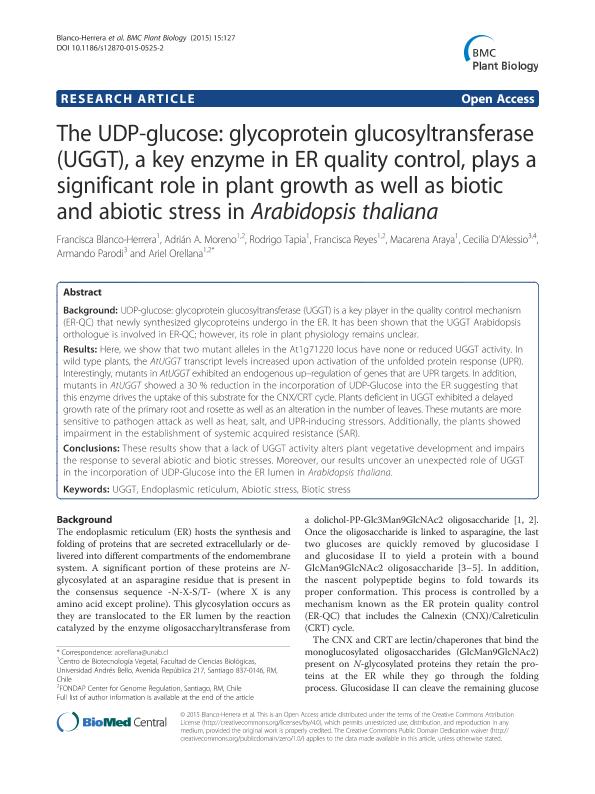Mostrar el registro sencillo del ítem
dc.contributor.author
Blanco Herrera, Francisca
dc.contributor.author
Moreno, Adrián A.
dc.contributor.author
Tapia, Rodrigo
dc.contributor.author
Reyes, Francisca
dc.contributor.author
Araya, Macarena
dc.contributor.author
D'alessio, Cecilia

dc.contributor.author
Parodi, Armando Jose A.

dc.contributor.author
Orellana, Ariel
dc.date.available
2017-08-28T18:54:36Z
dc.date.issued
2015-05
dc.identifier.citation
Blanco Herrera, Francisca; Moreno, Adrián A.; Tapia, Rodrigo; Reyes, Francisca; Araya, Macarena; et al.; The UDP-glucose: glycoprotein glucosyltransferase (UGGT), a key enzyme in ER quality control, plays a significant role in plant growth as well as biotic and abiotic stress in Arabidopsis thaliana; BioMed Central; BMC Plant Biology; 15; 127; 5-2015; 1-12
dc.identifier.issn
1471-2229
dc.identifier.uri
http://hdl.handle.net/11336/23142
dc.description.abstract
BACKGROUND: UDP-glucose: glycoprotein glucosyltransferase (UGGT) is a key player in the quality control mechanism (ER-QC) that newly synthesized glycoproteins undergo in the ER. It has been shown that the UGGT Arabidopsis orthologue is involved in ER-QC; however, its role in plant physiology remains unclear. RESULTS: Here, we show that two mutant alleles in the At1g71220 locus have none or reduced UGGT activity. In wild type plants, the AtUGGT transcript levels increased upon activation of the unfolded protein response (UPR). Interestingly, mutants in AtUGGT exhibited an endogenous up-regulation of genes that are UPR targets. In addition, mutants in AtUGGT showed a 30% reduction in the incorporation of UDP-Glucose into the ER suggesting that this enzyme drives the uptake of this substrate for the CNX/CRT cycle. Plants deficient in UGGT exhibited a delayed growth rate of the primary root and rosette as well as an alteration in the number of leaves. These mutants are more sensitive to pathogen attack as well as heat, salt, and UPR-inducing stressors. Additionally, the plants showed impairment in the establishment of systemic acquired resistance (SAR). CONCLUSIONS: These results show that a lack of UGGT activity alters plant vegetative development and impairs the response to several abiotic and biotic stresses. Moreover, our results uncover an unexpected role of UGGT in the incorporation of UDP-Glucose into the ER lumen in Arabidopsis thaliana.
dc.format
application/pdf
dc.language.iso
eng
dc.publisher
BioMed Central

dc.rights
info:eu-repo/semantics/openAccess
dc.rights.uri
https://creativecommons.org/licenses/by-nc-sa/2.5/ar/
dc.subject
Uggt
dc.subject
Endoplasmic Reticulum
dc.subject
Abiotic Stress
dc.subject
Biotic Stress
dc.subject.classification
Bioquímica y Biología Molecular

dc.subject.classification
Ciencias Biológicas

dc.subject.classification
CIENCIAS NATURALES Y EXACTAS

dc.title
The UDP-glucose: glycoprotein glucosyltransferase (UGGT), a key enzyme in ER quality control, plays a significant role in plant growth as well as biotic and abiotic stress in Arabidopsis thaliana
dc.type
info:eu-repo/semantics/article
dc.type
info:ar-repo/semantics/artículo
dc.type
info:eu-repo/semantics/publishedVersion
dc.date.updated
2017-08-14T19:56:17Z
dc.identifier.eissn
1471-2229
dc.journal.volume
15
dc.journal.number
127
dc.journal.pagination
1-12
dc.journal.pais
Reino Unido

dc.journal.ciudad
Londres
dc.description.fil
Fil: Blanco Herrera, Francisca. Universidad Andres Bello; Chile
dc.description.fil
Fil: Moreno, Adrián A.. Universidad Andres Bello; Chile
dc.description.fil
Fil: Tapia, Rodrigo. Universidad Andres Bello; Chile
dc.description.fil
Fil: Reyes, Francisca. Universidad Andres Bello; Chile
dc.description.fil
Fil: Araya, Macarena. Universidad Andres Bello; Chile
dc.description.fil
Fil: D'alessio, Cecilia. Consejo Nacional de Investigaciones Científicas y Técnicas. Oficina de Coordinación Administrativa Parque Centenario. Instituto de Investigaciones Bioquímicas de Buenos Aires. Fundación Instituto Leloir. Instituto de Investigaciones Bioquímicas de Buenos Aires; Argentina. Universidad de Buenos Aires. Facultad de Ciencias Exactas y Naturales. Departamento de Química Biológica; Argentina
dc.description.fil
Fil: Parodi, Armando Jose A.. Consejo Nacional de Investigaciones Científicas y Técnicas. Oficina de Coordinación Administrativa Parque Centenario. Instituto de Investigaciones Bioquímicas de Buenos Aires. Fundación Instituto Leloir. Instituto de Investigaciones Bioquímicas de Buenos Aires; Argentina
dc.description.fil
Fil: Orellana, Ariel. Universidad Andres Bello; Chile
dc.journal.title
BMC Plant Biology

dc.relation.alternativeid
info:eu-repo/semantics/altIdentifier/url/https://bmcplantbiol.biomedcentral.com/articles/10.1186/s12870-015-0525-2
dc.relation.alternativeid
info:eu-repo/semantics/altIdentifier/doi/https://doi.org/10.1186/s12870-015-0525-2
Archivos asociados
